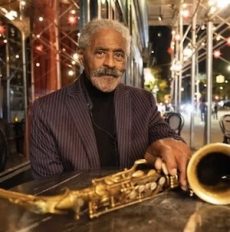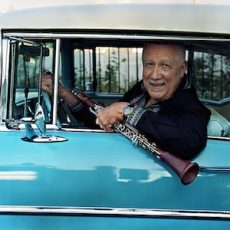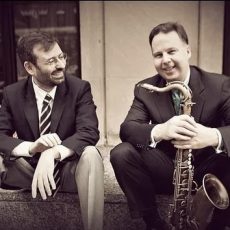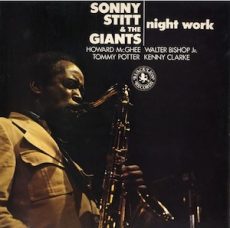
CHARLES MCPHERSON
Reverence | Record Release
Charles McPherson – alto saxophone | Terell Stafford – trumpet | Jeb Patton – piano | Peter Washington – bass | Billy Drummond – drums
“No jazz musician of the past 60 years has more palpably channeled the sound of Charlie Parker than alto saxophonist Charles McPherson.” – Jazziz
Alto saxophonist and bebop legend Charles McPherson celebrates the release of his new Smoke Sessions album, Reverence, with his quintet featuring trumpeter Terell Stafford, pianist Jeb Patton, bassist Peter Washington, and drummer Billy Drummond. One of the most acclaimed and beloved voices in jazz, McPherson’s rich musical style is rooted in the blues and bebop and has influenced and inspired generations of musicians and listeners for over six decades. He has performed at concerts and festivals around the world with jazz greats like Barry Harris, Billy Eckstine, Nat Adderley, Jay McShann, Phil Woods, Wynton Marsalis, James Moody, Dizzy Gillespie, and others. In a recent review, Downbeat states, “As a still-vibrant jazz veteran with ties to innovators like Charles Mingus and Lionel Hampton, McPherson’s writing carries on the traditional weight of bebop and swing, buoyed with an inventive, contemporary spark.”
***PLEASE NOTE: All 7PM and 9PM shows at Smoke are Dinner Shows | Fees Apply To All Tickets
More Posts: adventure,album,club,genius,jazz,music,preserving,restaurant,saxophone,travel

ODE FOR JOE: CELEBRATING THE MUSIC OF JOE HENDERSON
Nicholas Payton – trumpet | Walter Smith III – tenor saxophone (Wed – Fri, 4/17 – 4/19) | Melissa Aldana – tenor saxophone (Sat – Sun, 4/20 – 4/21) | Renee Rosnes – piano | Peter Washington – bass | Al Foster – drums
An all-star group performs the music of Joe Henderson, one of the most distinctive and admired artists in jazz history. Henderson was a prolific composer who wrote numerous jazz standards and was a transcendent soloist who left a discography of classic albums. The Guardian called him “a giant of the jazz saxophone.” The New York Times added, “Mr. Henderson was unmistakably modern,” and quoted the great Benny Golson, “Joe had one foot in the present, the other in the future, and he was just a step away from immortality.” Pianist Renee Rosnes and drummer Al Foster each spent significant parts of their careers working alongside Henderson. They celebrate Henderson’s April 24th birthday.
***PLEASE NOTE: All 7PM and 9PM shows at Smoke are Dinner Shows | Fees apply to all tickets
More Posts: adventure,bass,club,drums,genius,jazz,music,piano,preserving,restaurant,saxophone,travel,trumpet

PAQUITO D’RIVERA QUINTET
Paquito D’Rivera is a living monument of Latin jazz. Born in Havana in 1948, he was introduced to music at an early age by his father, who is a classical saxophonist but also with a clear passion for listening to jazz. During his studies at the Havana Conservatory of Music he met Chucho Valdés with whom in 1967 he created the Orquesta Cubana de Música Moderna. But it was in 1973 that the two laid the foundations for their legend: they founded the group Irakere, mixing jazz, rock, classical and Cuban music. A mix with Western music certainly not too pleasing to the Cuban regime: it was precisely the continuous interference of the communist government that pushed D’Rivera to ask for political asylum from the United States in 1980.
Even in his new homeland he soon emerged as a beacon of Latin jazz . He collaborates with McCoy Tyner, George Coleman, Chick Corea, Tito Puente, Astor Piazzolla, while in his formations he welcomes young musicians, projecting them towards international fame (Michel Camilo, Danilo Pérez, Hilton Ruiz, Claudio Roditi). In 1989 he joined one of the most amazing Afro-Latin orchestras that have ever graced the stage, the United Nation Orchestra created by Dizzy Gillespie, of which he himself became director after Gillespie’s death.
He is the only artist who can boast of having won the Grammy Award for both jazz, Latin and classical music. And D’Rivera has won quite a few awards: the last two at the 2023 Latin Grammys for the best Latin jazz/jazz album ( I Missed You Too!, with Chucho Valdés) and for the best contemporary classical composition (the Concerto Venezolano , recorded by trumpeter Pacho Flores..
The Band:
Paquito D’Rivera: clarinet/saxophone | Jose Rivero: piano | Gaston Joya: double bass | Sebastian Laverde: vibraphone | Mauricio Zottarelli: drums
***Website requires translation
More Posts: adventure,clarinet,club,genius,jazz,music,preserving,restaurant,saxophone,travel

HARRY ALLEN & ROSSANO SPORTIELLO
Award-winning pianist, composer and educator, Rossano Sportiello is one of the world’s leading jazz piano players on the scene today, specialized in the styles from Harlem Stride Piano to Bebop to Contemporary Jazz.
A swinging jazz saxophonist, Harry Allen is a highly regarded performer whose musical inspiration and interpretive approach come from the giants and innovators of mainstream saxophone, including Coleman Hawkins, Ben Webster, Stan Getz, Illinois Jacquet, and Lester Young. Unlike many of his contemporaries, Allen has generally eschewed the modern, avant-garde, and impressionist schools of jazz of John Coltrane, Archie Shepp, and Ornette Coleman.
***Dinner is required with all reservations.
More Posts: adventure,club,genius,jazz,music,piano,preserving,saxophone,travel

Requisites
Night Work ~ Sonny Stitt And The Giants | By Eddie Carter
As a teenager growing up in the late sixties and early seventies, I was exposed to and enjoyed many different jazz saxophonists, thanks to my Mom and my uncles Ben, Bob, Emmanuel, and Mr. Leo Mintz. Sonny Stitt has always been one of my favorites. He enters this morning’s spotlight with Night Work (Black Lion Records BLP 30154) by Sonny Stitt and The Giants. It was initially recorded in 1967 but not released until 1974. Sonny Stitt is featured on alto sax (A1, A2, B1, B4), and the other giants are Howard McGhee (tracks: A1, A2, B3, B4) on trumpet, Walter Bishop Jr. on piano, Tommy Potter on bass, and Kenny Clarke on drums. My copy is the U.S. Stereo release (Black Lion BL-307).
The opener, Night Work by Howard McGhee, is an upbeat invitation to sit back, relax and ride the rhythm of the ensemble’s swift melody into Sonny’s opening solo. Howard has the next spot and delivers the goods with considerable agility, followed by Walter’s impeccably delivered reading. Howard and Sonny join forces to exchange a few ideas together before Kenny joins their conversation, leading to the reprise and ending. Matter Horns by the team of Eiger and Jungfrau slows the pace to mid-tempo for Stitt’s easygoing theme and relaxing opening statement. Howard comes in next with a pleasantly flowing solo. Walter continues the bluesy groove in the third reading. Tommy and Kenny add a great deal of pleasure to the next two interpretations ahead of the quintet, trading a few riffs together before the climax.
The second side starts with a gorgeous quartet rendition of Loverman by Jimmy Davis, Roger Ramirez, and Jimmy Sherman. It is a beautiful jazz standard that Sonny and the rhythm section begin with their exquisite melody. Sonny captures the standard’s delicacy and tenderness in the song’s lone interpretation preceding the foursome’s elegant conclusion. Both horns take a break for the rhythm section’s lovely version of Satin Doll by Duke Ellington, Billy Strayhorn, and Johnny Mercer. Walter shows a great deal of respect to Duke as he leads the trio through the introduction and melody. He continues making a personal impression on the song’s solo while Tommy and Kenny provide the support ahead of the theme’s restatement and close.
Howard steps into the spotlight with the rhythm section for Don’t Blame Me by Jimmy McHugh and Dorothy Fields. The trumpeter’s piercing tone penetrates the introduction before settling down for a pretty melody. Howard has an exceptionally fine spot as the song’s only soloist, complemented by the trio’s accompaniment culminating in a tender finale. Hello by Howard McGhee brings the album to a close and this song will remind listeners of Milt Jackson’s Bags’ Groove. McGhee’s muted trumpet shares the duties with Stitt during the melody. McGhee steps up first with an excellent muted solo. Bishop gets something cooking in the second statement, and then Stitt takes the spotlight next. Clarke gets the last word in an exchange with both horns ahead of the theme’s reprise and ending.
Alan Bates produced Night Work, and Helmuth Kolbe was behind the dials of the recording. The album’s sound quality is quite good with a solid soundstage that transports the listener to the studio as the musicians are playing. Sonny Stitt was one of the best jazz saxophonists, with a career lasting nearly four decades and a recorded discography of over one hundred albums. He was also proficient on the tenor sax and baritone sax. This is one of his best records, in my opinion, and if you are in the mood for a great sax album, I invite you to check out Night Work by Sonny Stitt and The Giants on your next record-shopping trip. If you’re looking to start a collection of his music, it’s worth seeking out for your library and a title I’m sure you’ll enjoy!
~ Don’t Blame Me, Loverman, Satin Doll – Source: JazzStandards.com
© 2024 by Edward Thomas Carter
More Posts: choice,classic,collectible,collector,history,instrumental,jazz,music,saxophone


